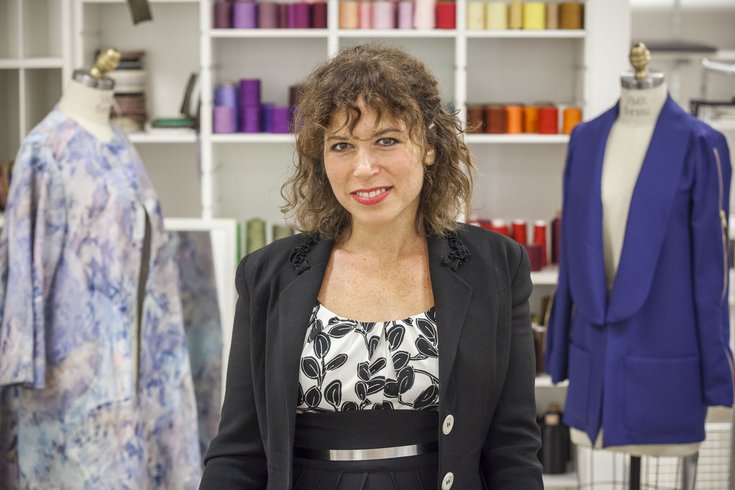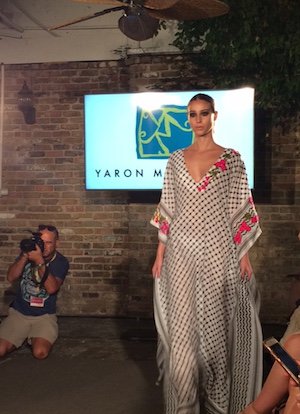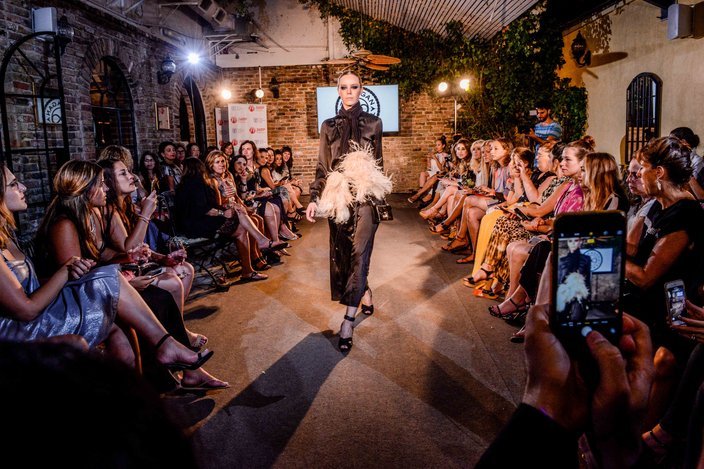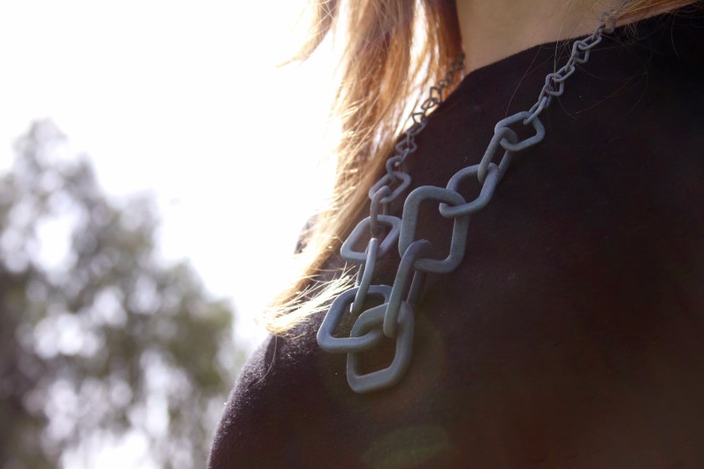
August 10, 2016
 Thom Carroll/PhillyVoice
Thom Carroll/PhillyVoice
Elissa Bloom, executive director of the Philadelphia Fashion Incubator
Earlier this month, Philadelphia Fashion Incubator Executive Director Elissa Bloom, who's quickly become one of the city's most enthusiastic cheerleaders for Philly designers, packed up for an eight-day trip to experience Israel's emerging fashion scene in Tel Aviv. Bloom was one of about three dozen fashion figures in the world selected to attend.
Here, she walks through the best of what she saw and how they can influence Philly's own designers.
How did you end up with this travel opportunity? What was it for?
I was invited by an organization called the Jewish Women’s Renaissance Project; it launched in 2009. They received a grant to focus on a specific sector of an industry and connect people who work in the fashion sector outside of Israel with the Israeli fashion industry. To get, really, more exposure and connected to what’s happening in the design scene in Israel. It was industry-specific, where there were women from around the world. There were some women from California, L.A., Florida, Minnesota, Chicago, North Carolina, Canada, Panama, Estonia, Australia, South Africa and Greece. [It was exciting] being able to connect with these 36 women on the trip, learning more about the work they're doing in the industry and then being able to meet with some of these Israeli designers.
So, we had a few different events and meetings planned, and one was where we had six designers — accessories and apparel designers — who presented their product and brands to us, and we had an opportunity to shop their lines. And then there was a fashion show they had specifically for a group, and there were about eight different designers that showed in Tel Aviv. And that was really inspiring, just to see the incredible fashions.
 Elissa Bloom/Elissa Bloom
Elissa Bloom/Elissa BloomA design by Yaron Minkowski, a leading fashion designer in Israel.
One really big takeaway is the quality of fabric I saw. They’re very much into the touch and feel, and comfortable, casual, lightweight fabrics that flow easily and wear easily on the body. I think that’s so crucial as a woman, wanting to put on something that feels comfortable and soft. And then just the silhouettes I found really interesting, and again just very functional — the way they put things together. And being able to wear some of the pieces multiple ways. And so that was interesting.
We also had a tour of Maskit, which is Israel's first fashion brand known worldwide, started by Ruth Dayan, Moshe Dayan’s wife ... It was very successful, [but] it went out of business in the ’90s. And just two years ago, this woman, Sharon Tal, but she was one of the head designers at Alexander McQueen. So she went to Shenkar University and then moved to London and then worked for McQueen and came back to Israel to start a family. She got in touch with this client and said, ‘I want to help you relaunch this brand.’ So now she is the head design director for Maskit, and that was exciting — to be able to meet the design director and see their store and beautiful workmanship. A lot of embellishment, handwork, couture-like, quality pieces.
What is Israel known for in fashion?
I think overall, as far as the look and the feel, it's very loose, comfortable casuals, but well-put-together. I think a lot of Israelis like to accessorize. They have such incredible jewelry, just beautiful, big, beautiful earrings and belts and rings and bracelets. The jewelry was fantastic. And they just — it’s a very casual, sophisticated look that I saw overall, and again, just getting back to the textiles and the fabrics they use, everything is very soft, high-quality fabrication.
If you had to pick standouts among what you saw, among designers and what they made, what would those be?
One was this caftan look from Yaron Minkowski, these beautiful, embellished caftans that seem really on-trend and very comfortable, but also the perfect piece to wear out for an event. And then just the handwork and craftwork that I saw at Maskit; I had never seen the type of embellishments, it almost looked like it was raised out. But just the intricacy of the embroidery and the beadwork and the type of materials they were using for the embellishment I had never seen used before in that way, in that technique.
 Aviram Valdman/Elissa Bloom
Aviram Valdman/Elissa BloomA model wears pieces from Israeli designer Liora Taragan during a showcase in Tel Aviv in August 2016.
There was this really interesting company — we had five Israeli tech entrepreneurs who went to a co-working space called WMN in Tel Aviv, and so they pitched their companies to us, and one of them, this woman developed this type of smocking that is used for — she developed an accessories line. But she wanted variations of smocking — a technique done a lot in women’s and children’s dresses, where material is gathered and folded and then there’s elastic sewn across it. So she developed with these engineers these formulas for smocking. It’s pretty open-source — she decided she doesn’t want to trademark or patent it, so anyone can download and use these smocking templates she’s created. I thought that was interesting.
And then this company called Trench that is an online service where you can shop in one another’s closets, and instead of using money, they’re called ‘diamonds,’ like a monthly membership, and there’s no money exchanged between two people. So let’s say I have something in my closet I haven’t worn in a year, some Moschino jacket, but I still like it and don't want to get rid of it yet. I can put that up and say, ‘I want three diamonds for this.’ And someone who wants to wear that can borrow it. It’s still in beta testing.
There was also this website called Cercle, a website that is promoting emerging designers from around the world and also using crowdfunding but not on a specific item. ‘OK, I’m going to give $180 to the Elissa Bloom brand,’ and then you don’t know what you’re getting until after I have it produced. And if you don’t want it, you can get your money back, but it’s a way of crowdfunding, but again, not on like specific items, that’s been done here in the U.S.
 From Facebook/Miz. Nitzan Kish
From Facebook/Miz. Nitzan KishA 3-D-printed necklace, from Miz. Nitzan Kish.
And then this other fascinating company, this woman does jewelry design on a 3-D printer, and she’s been attacked a few times by men on a bus, sexually. And so she developed this 3-D, self-armor for women with a bracelet, and she also did this back piece — so you wear this bracelet, it doesn’t hurt you, but it can hurt an attacker. I thought that was fascinating, seeing how they’re seeing these issues in the world and finding a solution through design and technology.
Out of what you saw, what do you think could permeate culture here?
I think fashion tech is really taking off here in the U.S. And there’s so much collaboration taking place, especially in Israel, and I’m starting to see that more here in the U.S. Even our designers, thinking, 'How can we incorporate technology into our brands?' Whether it’s into the clothing, or into the way that people are shopping a brand. Milano Di Rouge is starting an app, which is the first time we have a designer in our program doing an app for her brand, which I think is exciting. Finding more ways to integrate technology into fashion, whether through products or the way designers are doing business.